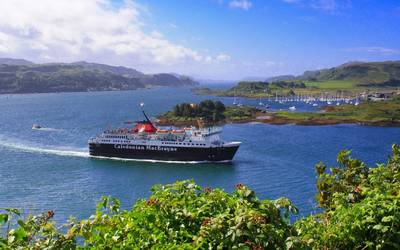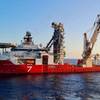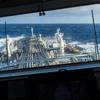The Project SEAHORSE consortium, led by the University of Strathclyde, brought together experts from across the maritime world to research and implement safety considerations pioneered by the aviation industry – the first project of its kind in the world.
It has been recognized with the Maritime Safety Award from the Royal Institution of Naval Architects in association with Lloyd’s Register.
Headed up by Professor Osman Turan from the University of Strathclyde’s Department of Naval Architecture, Ocean and Marine Engineering, the consortium also includes Scottish ferry operator Caledonian MacBrayne, among an internationally diverse group of other global industry leaders from various relevant sectors.
Inspired by the rigorous standards in the aviation industry and seeking to influence best practice across commercial shipping, the EU FP7-funded research project has sought to develop and establish straightforward systems to ensure best levels of safety in a range of areas, from checklists and safety reporting to standardised operating procedures.
While a checklist sounds like a very basic notion, the project began from the premise, that while many companies were indeed using such tools, these varied wildly in what was being checked and many had developed to become cumbersome rather than an effective method to ensure safe operations.
One of the primary pioneers of improved checklists, CalMac Ferries, which in turn collaborated with Airbus as advisers, drew up and trialled a new system across 10 of the company’s roll-on, roll-off ferries, which serve much of Scotland’s west coast – it was developed with input from the masters and refined as the trial progressed to involve minimum time commitment whilst guaranteeing that safety critical items were verified both on approach and when leaving port.
Crucially, as with a checklist on board an aircraft, the system requires a check command and a verification reply, which ensures that two persons must ratify each step, thereby removing what had been a critical weakness in previous similar routines – in other words, what is known as a ‘single point of failure’ (eg only one person responsible for checks) was mitigated and removed as a risk.
While not all the items on CalMac’s checklist will apply across all types of commercial shipping, it does provide a tried and tested framework which is easily transferrable to other shipping sectors.
The system has since been adopted within CalMac, and is just one of the areas in which SEAHORSE now offers proven and robust innovations which can find a place globally within the marine sector.
Safety culture assessment methodologies are already being adopted by other companies within the shipping industry.
Project leader, Professor Osman Turan, said: “SEAHORSE has shown that methods used to ensure high levels of safety for one form of transport can be effectively transferred to another.
“This breakthrough could lead to stronger co-operation between different modes of transport and the sharing of best practices across sectors in order to enhance safety.”
Speaking about CalMac’s key role within the project, the company’s Director of Health, Safety, Quality and the Environment, Louis de Wolff, said: “We were the most active marine industry partner within the project, providing validation of various solutions from application within a real-world environment.
“We continue to work closely with the University of Strathclyde on enhancing safety and resilience within our operations – the success of our involvement to date lies not only with my safety team, but with the full co-operation and collaboration we have had across the fleet from our professional mariners.”














